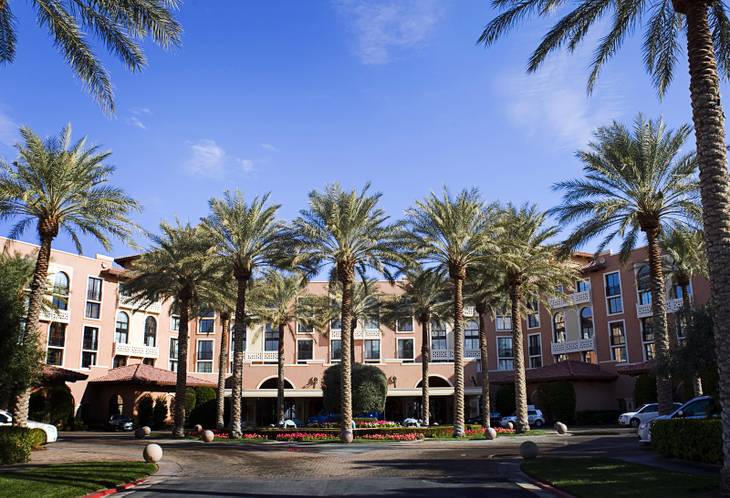As the Southern Nevada gaming and tourism economy improves in 2012, financial restructurings of troubled companies and properties are expected to slow down.
But such troubles are continuing for some companies, as evidenced by debt defaults involving Loews Lake Las Vegas Hotel in Henderson and the JW Marriott Las Vegas casino resort in Summerlin.
Their recently disclosed defaults follow a difficult 2011 for the local resort industry.
Last year, control of the M Resort, the Palms, the Hard Rock and the Westin Casuarina was transferred to holders of the properties' debt, while foreclosure proceedings were initiated against the Las Vegas Hilton — now the LVH Las Vegas Hotel & Casino — and Hooters hotel-casino filed for bankruptcy.
Those changes followed the restructurings in 2009 and 2010 of Tropicana Entertainment LLC, Fontainebleau Las Vegas, Station Casinos Inc., Herbst Gaming, Riviera Holdings Corp. and Black Gaming.
"We believe that the major restructuring is behind us unless we face another economic hurdle or there is a double dip recession," said John Knott, a prominent casino and hotel broker in Las Vegas at CBRE (CB Richard Ellis). "Most of the gaming companies and the lenders worked very hard to get through these last few years. Improving revenue should have a beneficial impact on EBITDA (a profitability measure meaning earnings before interest, taxes, depreciation and amortization). We have already seen this with some properties. We hope this leads to employment growth."
While the Global Gaming Group at CBRE expects growth in gaming revenue on the Las Vegas Strip this year of up to 4.8 percent and hotel room rates to increase up to 6.2 percent, Knott said: "This does not mean that there is not a property out there that could face its own unique challenges depending on its own (debt) leverage dynamics."
"But we do not see the entire industry needing to restructure. as was the case a couple of years ago," he said.
It’s unknown how the recent defaults at Loews Lake Las Vegas and the JW Marriott will be resolved, and officials with companies that own those properties couldn’t immediately be reached for comment.
But based on recent appraisals, it’s likely investors in their debt face steep losses regardless of whether the loans are renegotiated, the properties are foreclosed on or they are sold.
Assured Lenders Services Inc., trustee of the $117 million Loews Lake Las Vegas loan, initiated foreclosure proceedings against that property Dec. 12. The initial paperwork didn’t specify an auction date. Its mortgage is held by investors after it was syndicated in 2007.
Trepp LLC, which tracks commercial loan data, reported the 493-room property was valued at just $29.4 million when last appraised in February — meaning it’s worth only 25 percent of the debt encumbering it.
The property’s loan first moved into special servicing in March 2009 because the recession was especially harsh on Lake Las Vegas, which went through its own bankruptcy and saw its hotels endure steep declines in business and leisure travel.
Later in 2009, the property was placed in control of a receiver after lenders sued to take it over.
"REVPAR (revenue per available room) levels show declines from 2010 as group business demand is down due to corporate cutbacks and concerns of Lake Las Vegas’s future," the loan’s special servicer commented last month. "Transient demand is also down with heavy competition from not only the Las Vegas Strip, but also resorts throughout the Southwest and California."
Loews Lake Las Vegas, while under the control of a receiver, is owned by a New York company called Loews LLV Hotel LLC.
As for the JW Marriott in Summerlin, foreclosure proceedings have not been initiated against it.
But the fact that it defaulted on its $160 million mortgage loan on Nov. 9 was disclosed Dec. 28 when a court fight broke out among investors in that loan.
Senior lenders complained in the New York Supreme Court lawsuit that a junior investor in the loan, a company called Galante Holdings Inc., was trying to buy the loan for $84.5 million.
The senior lenders said the move was "the brazen scheme of a junior lender who here attempts to steal more than $60 million in value from a group of senior lenders" who would be deprived of the right to foreclose on the property or otherwise control the loan.
That accusation was denied by Galante, which said its purchase was authorized by the loan pooling deal it invested in and that by acquiring the loan it would be a "potential equity participant" with current ownership of the JW Marriott.
An attorney for Galante said in a court declaration that the JW Marriott "has had a difficult financial history" and requires $40 million in capital for upgrades.
"Closing the purchase of the (loan) would permit Galante to commence immediate discussions with ownership about restructuring the debt and undertaking other capital and FF&E (furniture, fixtures and equipment) improvements," attorney John Reilly said in his affidavit.
Included in the New York lawsuit is a recent appraisal finding the Summerlin property is worth just $98.4 million, making it deeply underwater on its mortgage, like the Loews Lake Las Vegas property.
Trepp, in its latest report on the 548-room JW Marriott, noted the $98.4 million appraisal amount was down sharply from the boom year of 2007, when it was valued at $324 million.
PFK Consulting USA of Los Angeles, which conducted the latest appraisal, reported the JW Marriott’s gaming win fell during the recession from $79.8 million in 2007 to $61.7 million in 2010.
The appraiser noted the hotel’s performance had slipped as well, producing revenue per available room of $81.08 in 2010, down from $140.23 in 2007.
The JW Marriott was purchased out of bankruptcy in 2001 by Larco Investments Ltd. of Vancouver. At that time, the property was called the Regent Las Vegas.
The property is still owned by Larco and its affiliated company Hotspur Resorts.
